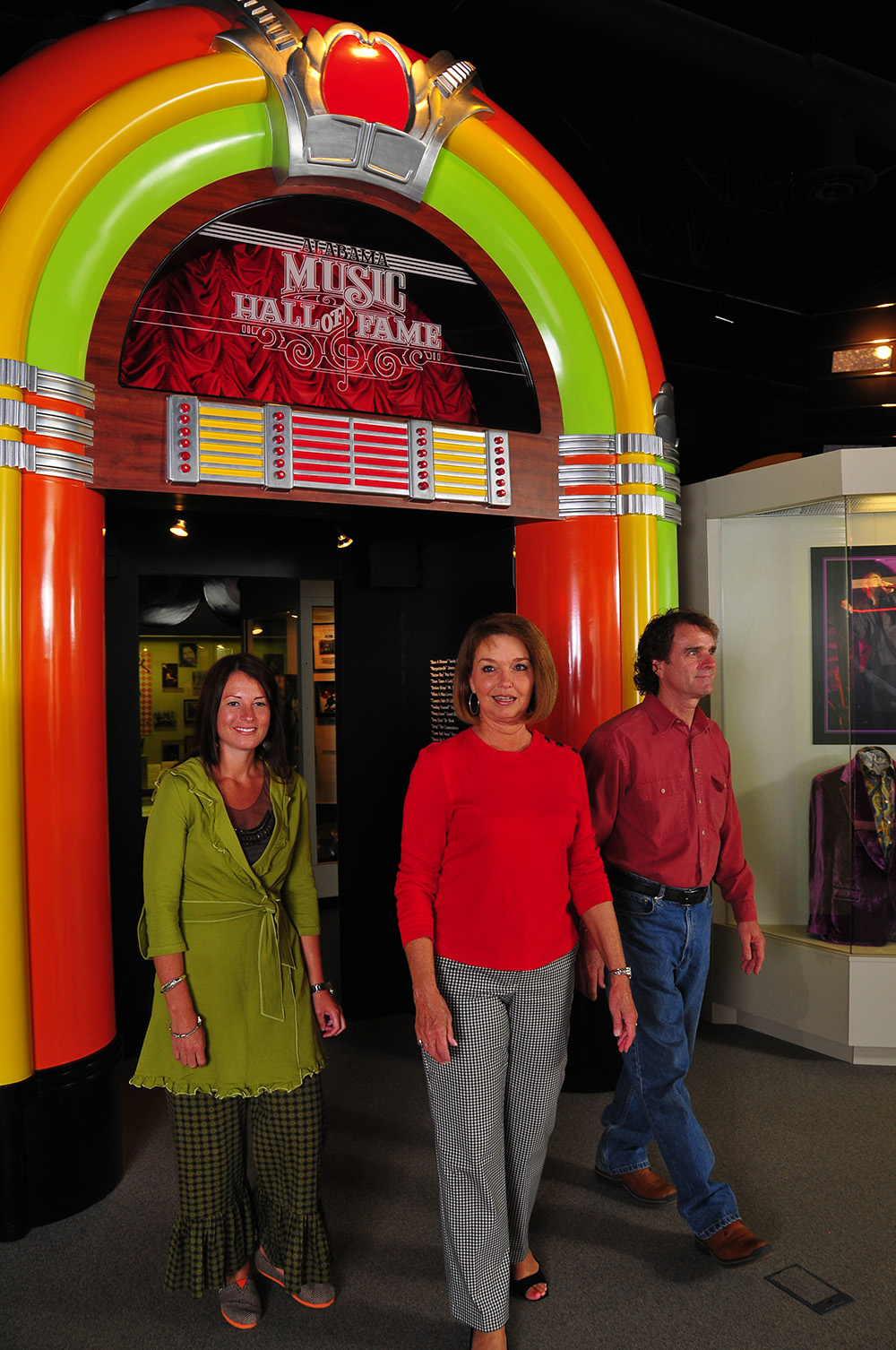By Emmett Burnett
 Songs of Alabama have enriched lives since the state was a state of mind. But our songs in the heart, notes in the head, and lyrics in memory are more than meets the ear. How many tunes about the Heart of Dixie can you name? (And by the way, “Heart of Dixie” is the title of the 2013 debut single of country singer Danielle Bradbery – though it isn’t actually about Alabama.)
Songs of Alabama have enriched lives since the state was a state of mind. But our songs in the heart, notes in the head, and lyrics in memory are more than meets the ear. How many tunes about the Heart of Dixie can you name? (And by the way, “Heart of Dixie” is the title of the 2013 debut single of country singer Danielle Bradbery – though it isn’t actually about Alabama.)
Missing home
Nashville recording artist Allison Moorer explains the popularity of Alabama namesake songs: “The word sings well. It flows,” she instructs and offers proof. “Try it. Say ‘Alaaaa Bamaaaa.’ See? It flows. You can’t do that with Rhode Island.”
Raised in Washington County, the younger sister of country star Shelby Lynne is well qualified to speak of flowing words. Allison has written over 200 songs, released 7 albums and 11 singles, including “Alabama Song.”
From her debut album of the same name, the lyrics speak of home “where the trees grow tall and green…where the skies shine bright and blue…if you’re going, I’m going with you.”
“I wrote it 20 years ago, a time when I was away from home,” she recalls. “I felt a little marooned and was thinking how special it is returning to the Deep South.”
It came from outer space
We all love “Stars Fell on Alabama,” but beware. It has a dark side. The tale of starry-eyed sweethearts was inspired by a night of terror.
On Nov. 12, 1833, the greatest meteor sighting in recorded history ignited southern skies like a nuclear bomb. There were estimates of 200,000 shooting stars per hour. And on a clear moonless night, Alabama was Ground Zero.
“In 1833 there was no news and no warnings,” notes Bill Cooke of the Meteoroid Environment Office at Marshall Space Flight Center in Huntsville. “Terrified, many thought it was the End Times.”
Frightened masses shivered under wagons and in shelters – impromptu shields from heaven’s wrath. A horrified cotton planter noted, “My God, the world is on fire.”
In 1934, Carl Carmer wrote a book of essays titled “Stars Fell on Alabama,” acknowledging 1833’s spectacle. Inspired by the book, music composer Frank Perkins and lyricist Mitchell Parish realized the potential for a song of the same name.
But how does one create music based on a stellar holocaust? Easy: Love conquers all, even flying space rocks. Hence the lyrics:
“We lived our little drama
We kissed in a field of white
And Stars Fell On
Alabama Last night…”
“Little drama,” perhaps the biggest understatement in music history, alludes to the fear-frozen night, when stars fell on Alabama.
Turn it up
The words “Sweet Home Alabama” have been embossed on automobile tags, served as an unofficial motto, and been licensed by the State Department of Tourism. And the Lynyrd Skynyrd song that made it popular? Wow.
“It has been used in various facets, from political campaigns to countless movies,” says Rachel Morris, archivist and coordinator at the Center for Popular Music at Middle Tennessee State University. “It is perhaps the most recognized song about Alabama.”
Ironically, “Sweet Home Alabama” was written by two Floridians and a Californian, and recorded in Georgia. It is basically a protest song of a protest song.
“Lynyrd Skynyrd responded to Neil Young’s ‘Southern Man’ and ‘Alabama,’ which dealt with racism and slavery in the American South,” notes Alabama Tourism Department publications director Rick Harmon. But there was never a feud between the band and the artist.
The lyrics cover a broad range of mid-1970s issues, including Watergate, Gov. George Wallace, and prevailing music trends.
Many ponder the song’s famous first words, “turn it up.” Hidden message? Secret code? Buried treasure map? After years of research, the true meaning of “turn it up” is revealed: Turn it up means turn it up.
During recording, lead vocalist Ronnie Van Zant asked someone to increase the volume in his headphones. Unaware the microphone was live, Van Zant’s request was immortalized.
That old college try

Photo by Marilyn Jones
You don’t know Ethelred Lundy Sykes. But if you’ve ever watched an Alabama football game, you know his work.
In the early 1920s, the Birmingham native competed for a University of Alabama scholarship and lost. But Ethelred enrolled anyway, becoming active in student life and continuing his unwavering passion for contests.
In 1926 he submitted an entry in the school’s Rammer-Jammer humor magazine’s quest for best new battle march. Sykes’ musical offering was a little ditty he called, “Yea Alabama!”
Perhaps you’ve heard it: “Yea Alabama! Drown ‘em Tide! Every Bama Man’s Behind You, Hit your stride.” Yep, Ethelred wrote that, and won $50.
“Yea Alabama!” became the University of Alabama fight song, typically sung by a choir of 150,000 at the top of their collective lungs at Bryant-Denny Stadium.
The late Ethelred Lundy Sykes never wrote another song, opting instead to join the military, where he served in the U.S. Air Force Strategic Air Command, and retired as a brigadier general.
The ghost who sang “Your Cheating Heart”
Music is often described as hauntingly beautiful, but “Midnight in Montgomery” is beautifully haunted.
With close to 3 million YouTube hits, the video rivals the song in popularity. Lyrics unfold a story at Hank Williams’ Oakwood Annex Cemetery gravesite. Singer Alan Jackson, en route to a gig, steps off a Montgomery bus to pay respects to country music’s king.
But the late Hank Williams is no longer late. Jackson sees a ghost.
“I don’t know if the video and song increased visits to Williams’ burial site,” says Oakwood’s spokesman, Phillip Taunton. “People have visited the grave almost daily since Williams died (Jan. 1, 1953).” They often leave mementos like flowers, guitar picks, and bottles of beer. Which perhaps Hank Williams appreciates, because as Alan Jackson croons, “Oh Hank’s always singing there.”
Alabama, our official song
In the mid-1860s, Tuscaloosa’s Julia S. Tutwiler, educator, humanitarian, and women’s rights advocate, completed her European studies and returned to Alabama. The state of the state left her heartbroken.
Tutwiler felt we could do better. Documents provided by Courtney Pinkard, reference archivist at the Alabama Department of Archives and History, noted Tutwiler’s thoughts: “Never for a moment doubt the outcome of struggle if maintained with courage and devotion to principle.”
Around 1868, she wrote a poem, which later became “Alabama,” a rallying cry set to music by Birmingham composer and organist Edna Cockel-Gussen in 1917. It became our official song by a vote of the Legislature on March 9, 1931.
Several attempts have been made to replace it. “It has an elementary school auditorium assembly feel to it, but you aren’t going to please everyone,” says Kevin Nutt, folk life archivist at the Archives. “’Sweet Home Alabama’ was floated as a replacement. Who can sing that?”
For now, Tutwiler’s classic rules. Each stanza ends with “Alabama, Alabama, We will aye be true to thee!” May it be said by us all, in music, lyrics, and song.




